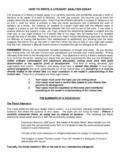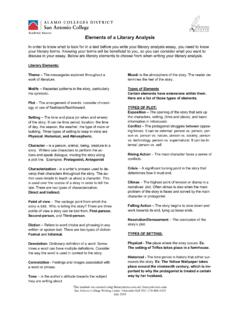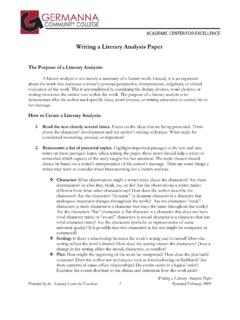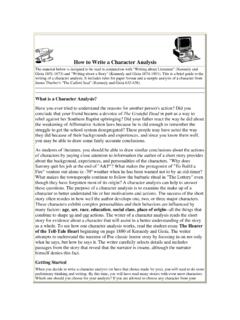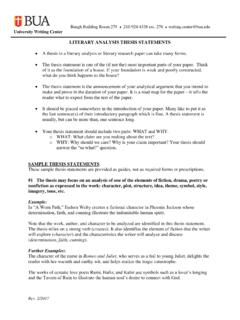Transcription of CHIEF JOSEPH’S “SURRENDER SPEECH” AS A LITERARY TEXT
1 George Venn joseph s speech as LITERARY Text revised from Oregon English Journal 20. (1998): 69-73 OCHC Reprint by Permission CHIEF joseph S surrender speech AS A LITERARY TEXT* George Venn 1998 October 5, 1877, Bear s Paw, Montana Territory Cold wind, new snow, dying grass, northern plains, white mountains, bronze light. Below the open ridge, dead and wounded men lay in Nez Perce and Army camps. Wallowa Valley women, children, and men have fled 1,200 miles since June. That flight ended here. The five-day military conflict and negotiation finally resolved.
2 CHIEF joseph rode a black horse up the ridge, his hands crossed, his head bowed. Five Nez Perce men walked with him. Above him, the bulky silhouettes of waiting whitemen: Brigadier General Oliver O. Howard, Commander; Colonel Nelson A. Miles, Fifth Infantry, Yellowstone; Second Lieutenant Wood, Howard's aide-de-camp and adjutant; Second Lieutenant Oscar F. Long, Miles aide-de-camp, Ad Chapman, and perhaps Nez Perce messengers Old George and Captain John. joseph dismounted, offered his rifle to General Howard. Howard waved joseph to Colonel Miles. Even though Howard and his troops had pursued the Nez Perce for 1,200 miles, the Nez Perce *_____ Precursor to SOLDIER TO ADVOCATE (2006), this essay was first presented at the Oregon Cultural Heritage Commission Wood Symposium, Portland, October 17, 1998.
3 George Venn joseph s speech as LITERARY Text had until Bear s Paw successfully eluded or outrun Howard. Notified by telegraph, Miles had caught the Nez Perce by making a 200-mile forced march to Bear s Paw , surrounded the fleeing Indians, driven off their horse herd, and after failing to overrun the Nez Perce, settled for siege until Howard arrived and negotiated with joseph for a surrender . To reward Colonel Miles, General Howard had agreed to give The Official surrender an honorific military ceremony foreign to Nez Perce tradition to his junior.
4 Since that 1877 event, what joseph said or didn't say after he handed his rifle to Colonel Miles has been disputed possibly the longest dispute over a text in western American literature. Wood, the 25-year old aide-de-camp of General Howard, publicly claimed all his life that he wrote down verbatim a 155-word (+-) speech given by CHIEF joseph after he handed over his rifle. No one at Bear s Paw that day including General Howard ever published anything corroborating Wood s text. While he had varying degrees of editorial control over the nineteen versions of the speech published between 1877 and 1939, Wood also revised the text, speaker, and contexts.
5 After Wood s death in 1944, historians doubting Wood s veracity became more explicit, even though the surrender speech had become nationally-accepted as authentic Native American oratory. Since 1972, several historians have formally denounced Wood as prostituting the truth, as being unreliable, as composing the famous speech himself, as not being particular about the truth. As a result of their critique, joseph is now represented in George Venn joseph s speech as LITERARY Text many anthologies and texts with An Indian s View of Indian Affairs, his much longer 1879 speech in Washington, in which joseph narrates the tragic Wallowa Valley Nez Perce story.
6 This attack by contemporary historians on a poet, soldier, attorney, anarchist perhaps the most complex LITERARY figure in the early Northwest raises a cloud of fascinating questions. Neither Wood nor joseph can clarify much now. Wood s ashes were scattered in 1944 in an oak grove above Los Gatos, California, and joseph was buried on the Colville Reservation in 1904. During his lifetime, Wood never publicly retracted his verbatim claim: he was always the only person to record joseph 's reply to General Howard. Wood s 1877 journals end in Idaho early in the Army s pursuit. Wood s original text he always said was lost by Army archivists.
7 No other person at Bear s Paw ever directly quoted or repudiated Wood s text. So, consider for a moment that the controversy is still open: here stands Wood the soldier/poet/attorney now accused of lying his entire lifetime about the authenticity of the CHIEF joseph surrender speech ; there stand Wood's contemporary accusers. What follows here will be a few of many interrogatories for a grand jury of readers. Did Wood ever say the surrender speech was not a verbatim transcript of joseph ? Yes and no. In 1936, at the age of 84, the poet himself wrote the following unpublished letter to Lucullus McWhorter, his earliest CHIEF examiner: George Venn joseph s speech as LITERARY Text My dear McWhorter Don t expect me to correct all the misconceptions about joseph and at 84 I will not guarantee my own recollection But as often happens I remember this surrender more clearly than the events of last year.
8 Further General Miles nor anyone else knows joseph 's surrender speech accurately except myself. No one was interested to take it down Oscar Long Miles regimental adjutant was there to take it down but did not no one was told to take it down I was not told the speeches of Indians were not considered of importance I took it for my own benefit as a LITERARY item (my emphasis) and I have told you I at request gave it to the Adjutant General of the Army in Washington for the archives and it (1/31/36, WSU) What might Wood have meant here saying privately that the surrender speech was taken as a LITERARY item? He may well have intended the speech as a work of art and used commonplace LITERARY conventions: selecting, arranging, and interpreting the facts to create an illusion that somehow made the facts more illuminating, truthful, comprehensive.
9 Wood had many LITERARY precedents here: he knew classical historians such as Tacitus were famous for inventing speeches to condense events and heighten drama; he knew the treaty speeches by Eastern chiefs such as Red Jacket who addressed whites with wise King Solomon oratory; he knew that Chapman s translation of joseph would be literalistic, so he could create his own version of any translation George Venn joseph s speech as LITERARY Text he heard; Wood had read historical novelists, such as Walter Scott, who always pretended to be factual while writing fiction.
10 Calling the surrender speech a LITERARY item also might have been Wood's way of alluding to his interest in poetic form. While the speech has always been printed as a prose paragraph, the three-part Shakespearean or heroic sonnet form seems to shape the piece. To be specific, consider a brief analysis of the version Wood published as prose in Century Magazine, July, 1893, in his signed article, Famous Indians: Portraits of Some Indian Chiefs. to write a Shakespearean or heroic sonnet, the poet must first sustain a list of images that generates a consistent tension and emotion. Since Wood did not fight the Bear s Paws battle with Miles troops, he learned this list of facts from joseph , from interpreters, or from unknown sources.
